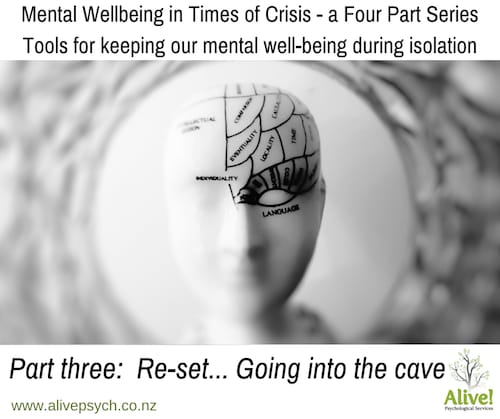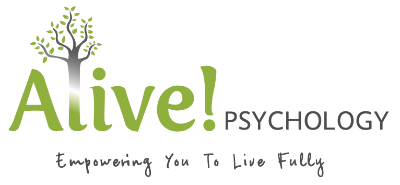Tools for keeping our mental well-being during isolation
 There are three aspects to maintaining mental wellbeing at this time. These are not distinctive phases, but some previous behaviours need to achieved before we can build on the next and other suggestions are useful in all three stages.
There are three aspects to maintaining mental wellbeing at this time. These are not distinctive phases, but some previous behaviours need to achieved before we can build on the next and other suggestions are useful in all three stages.
1. Stop the fear mentality
2. Re-set - going into the cave
3. Re-build - coming out of the cave
Re-set - going into the cave
With our busy, active lives, many of us are completely out of kilter with our needs. It is like the first few days of a holiday – ahh, finally I can stop and recover.
If you are still working, this part will look different. It is trying to find ways of achieving some of the reset.
The re-set is about allowing ourselves to get back on track to healthy living. This is simple the basics of life that until now, we have been too busy to do.
Sleep. Many of us are massively sleep deprived. Life is too busy to have decent sleep. So with isolation, allow yourself to lie in longer, to get a full 8-10 hours sleep in the first few days.
In order to get refreshing sleep, we need to know how to turn off the fear mind and relax. This is a challenge for many. Practice makes perfect. It might take a week or two before you feel that you can really let go and relax. Give it time. Be patient. We can’t force sleep and relaxation, they are by-products of letting go. Mindfulness strategies are really helpful to learn how to relax and let go.
Develop healthy eating patterns. Again, with our hectic lives, we have been too busy to really focus on what we eat – to focus on the fuel that we are energising our bodies with. Now with simplicity, and take-outs limited, we have the opportunity to cook healthy meals for ourselves and our families.
Research has shown conclusively that there is a strong link between poor nutrition and poor mental health. So use this opportunity to upskill in the kitchen, you have all the time in the world to try out a new recipe and explore in the kitchen. YouTube is a great teacher.
This is also a great time to figure out how certain foods affect you.
Time out / me time. What is that? Until now, life has been so busy that there possibly was not time for yourself. Now you don’t have any errands to do, no sports or taking the children here or there, or running from one meeting to the next. There is now time to stop and be.
Like with the sleep, time out / me time is so foreign for most of us that we have forgotten how to do it. Don’t worry, keep trying in small ways until you get the hang of it. You’ve got time to figure out what me time means, what your version of it looks and feels like.
For some, the mindfulness practices are their ways of having me time or time out. It is literally sitting and doing nothing.
Develop or keep a routine. We are creatures of habit. It helps us to feel safe and organised. Routine helps us feel useful and productive. So daily, after getting up, have a shower and get dressed.
It is important that you dress up, as dressing communicates to us a sense of worth. It is okay to have a PJ day every now and then. But if we do it daily, our mood will drop and it is harder to climb out than stop doing in. Maybe even wear you finest clothing ever now and then. Dress for you, not because you are going out.
Your routine during the re-set might look different to your routine during the re-build stage. In the re-set, it is slower and more focused on giving your body what it needs – rest, nutrition, etc. In the rebuild, it is more active – but still with care to needs.
Part of routine is having a sense of accomplishment. Mimic a work routine - fixed meal times, with TV or relaxation only at the end of the day.
Set a goal for the day, and preferable, in the morning, as this will set up your energy for the rest of the day. Accomplishment can be big stuff like painting the wall or small stuff like cooking a meal. The ‘what’ is less important than the feeling it gives you. Please DO NOT watch TV or play games online from the morning – this drains our energy and we are less likely to want to do anything afterwards.
If possible, leave the house daily. Even if just a walk to the end of the street. (Remember social distancing.) Getting out helps decrease the feeling of being stuck. If possible, walk in nature. Nature helps to re-set our energy and is calming. If not possible to get out, sit in the garden, if you have one.
The courage to face yourself. On retreats, we deliberate go into silence. This allows us to become aware of our relationship with taking and our devices. What evolves rather quickly, is how I use interaction as a way of keeping me busy so that I don’t have to pay attention to my feelings, thoughts or me.
Isolation is gifting us a similar opportunity – become aware of your need, desire to keep busy or away from home. Suddenly we are without our usual distractions of work, socialising, gym, going to the bar and other recreational activities. I know I use busyness as escapism, now I can figure out what I am running from.
If you have the courage to face yourself, notice what it is that you run away from in your usual life. Notice your anxiety of not having anywhere to go or anything to do. Notice and welcome the restless. Sit with it and see what it reveals to you. This is courage. This is honesty. This is the best gift – knowing yourself.
Youthline:
https://www.youthline.co.nz/
Free call 0800 376 633
Free text 234
Depression:
https://depression.org.nz
FREE 24/7 HELPLINE:
0800 111 757 TEXT 4202
Healthline
0800 611 116
Mental Health Crisis Team (CATT Team)
Select your DHB for contact numbers or ring Healthline 0800 611 116.
Need to talk?
Free call or text 1737 any time for support from a trained counsellor
Lifeline
0800 543 354 (0800 LIFELINE) or free text 4357 (HELP)
Suicide Crisis Helpline
0508 828 865 (0508 TAUTOKO)
Samaritans
0800 726 666
